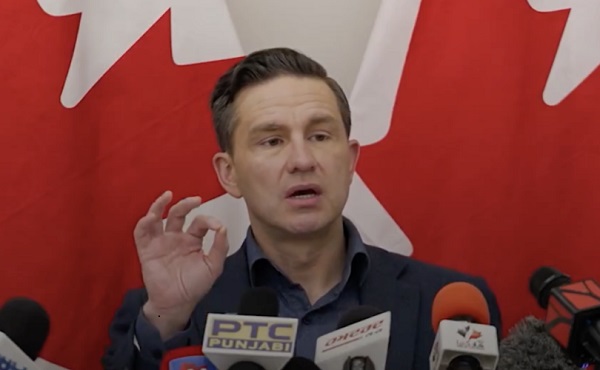Alberta
Province says books will be balanced again by 2022-23

Premier Jason Kenney and Finance Minister Travis Toews present the 2020 Budget: A Plan for Jobs and the Economy.
From the Province of Alberta
Third-quarter results show the deficit has declined more than expected. With the deficit $1.2 billion lower than projected in Budget 2019, Alberta taxpayers can expect to pay $35 million less in debt-servicing costs.
Budget 2020 also provides stable funding for health, education and core social services. The budget focuses on finding cost efficiencies and creating jobs while maintaining the high-quality services Albertans expect.
“Budget 2020 continues our focus on creating jobs, growing our economy and streamlining programs and services to ensure a sustainable future. Our plan is working. We are on track to balance the budget by 2022-23 and Alberta’s surplus in that year is expected to be higher than that projected in Budget 2019. We are also maintaining funding for health and education while ensuring each dollar is wisely spent on what Albertans need most.”
Included in Budget 2020 is A Blueprint for Jobs – the government’s plan to get Albertans back to work. It supports dynamic growth from the technology, energy, agriculture and forestry sectors and supports diversification in other key sectors through initiatives, including:
- Improving competitiveness through further reductions in the Job Creation Tax Cut.
- Accelerating growth-oriented projects through the capital plan to provide job opportunities for Albertans.
- Reducing red tape in all sectors to make Alberta the best place to do business in Canada.
- Accelerating the reclamation of “legacy sites” – including orphan wells – in ways that prioritize job creation.
- Filling gaps in the labour market, such as increasing access to training for Class 1 drivers.
“There is no greater job for our government than getting Alberta back to work. Budget 2020 and A Blueprint for Jobs leverage the natural strengths of our province and support new opportunities for diversification, economic growth and job creation. We are putting a growth and prosperity lens on everything we do to ensure the choices we make as a government support economic growth and jobs for Albertans.”
Budget 2020 capital plan highlights
The 2020 Capital Plan commits $6.9 billion in 2020-21 to build and maintain key infrastructure projects across the province. Over the course of the three-year fiscal plan, an estimated $772 million in new projects will be added, bringing the total capital plan to $19.3 billion. This will create opportunities for private sector participation and support more than 3,000 jobs, increasing employment by 2022. Some of the new projects include:
- Twinning Highway 40 to facilitate economic growth and improve safety.
- Funding to renovate the Peter Lougheed Centre to alleviate pressure on Alberta’s most-congested emergency department.
- New funding for critical laboratory equipment needs in Edmonton and northern Alberta.
- The Alberta Surgical Wait-Times Initiative, which will fund new operating rooms and purchase new hospital equipment. The initiative will reduce Alberta’s surgical wait times to an average of four months, funding 80,000 additional surgeries by 2022-23.
- The launch of a new Rural Health Facilities Revitalization Program to provide infrastructure upgrades across Alberta.
- Funding for the Red Deer Integrated Emergency Shelter for 160 new spaces for the homeless.
- Funding for the Bow Reservoir Options project to assess the feasibility of a multi-use dam on the Bow River.
Bill 4, also tabled today, implements a fixed budget period. This provision is an amendment to the Fiscal Planning and Transparency Act and aligns with a recommendation from the MacKinnon Panel.
A fixed budget period will help organizations that provide services for Albertans to better plan their own budgets. The fixed budget period means a budget must be released each year in the month of February.
Alberta
Province announces plans for nine new ‘urgent care centres’ – redirecting 200,000 hospital visits

Expanding urgent care across Alberta
If passed, Budget 2025 includes $17 million in planning funds to support the development of urgent care facilities across the province.
As Alberta’s population grows, so does the demand for health care. In response, the government is making significant investments to ensure every Albertan has access to high-quality care close to home. Currently, more than 35 per cent of emergency department visits are for non-life-threatening conditions that could be treated at urgent care centres. By expanding these centres, Alberta’s government is enhancing the health care system and improving access to timely care.
If passed, Budget 2025 includes $15 million to support plans for eight new urgent care centres and an additional $2 million in planning funds for an integrated primary and urgent care facility in Airdrie. These investments will help redirect up to 200,000 lower-acuity emergency department visits annually, freeing up capacity for life-threatening cases, reducing wait times and improving access to care for Albertans.
“More people are choosing to call Alberta home, which is why we are taking action to build capacity across the health care system. Urgent care centres help bridge the gap between primary care and emergency departments, providing timely care for non-life-threatening conditions.”
“Our team at Infrastructure is fully committed to leading the important task of planning these eight new urgent care facilities across the province. Investments into facilities like these help strengthen our communities by alleviating strains on emergency departments and enhance access to care. I am looking forward to the important work ahead.”
The locations for the eight new urgent care centres were selected based on current and projected increases in demand for lower-acuity care at emergency departments. The new facilities will be in west Edmonton, south Edmonton, Westview (Stony Plain/Spruce Grove), east Calgary, Lethbridge, Medicine Hat, Cold Lake and Fort McMurray.
“Too many Albertans, especially those living in rural communities, are travelling significant distances to receive care. Advancing plans for new urgent care centres will build capacity across the health care system.”
“Additional urgent care centres across Alberta will give Albertans more options for accessing the right level of care when it’s needed. This is a necessary and substantial investment that will eventually ease some of the pressures on our emergency departments.”
The remaining $2 million will support planning for One Health Airdrie’s integrated primary and urgent care facility. The operating model, approved last fall, will see One Health Airdrie as the primary care operator, while urgent care services will be publicly funded and operated by a provider selected through a competitive process.
“Our new Airdrie facility, offering integrated primary and urgent care, will provide same-day access to approximately 30,000 primary care patients and increase urgent care capacity by around 200 per cent, benefiting the entire community and surrounding areas. We are very excited.”
Alberta’s government will continue to make smart, strategic investments in health facilities to support the delivery of publicly funded health programs and services to ensure Albertans have access to the care they need, when and where they need it.
Budget 2025 is meeting the challenge faced by Alberta with continued investments in education and health, lower taxes for families and a focus on the economy.
Quick facts
- The $2 million in planning funds for One Health Airdrie are part of a total $24-million investment to advance planning on several health capital initiatives across the province through Budget 2025.
- Alberta’s population is growing, and visits to emergency departments are projected to increase by 27 per cent by 2038.
- Last year, Alberta’s government provided $8.4 million for renovations to the existing Airdrie Community Health Centre.
Related information
Alberta
Province pumping $100 million into Collegiates and Dual-Credit hands-on learning programs

Alberta’s government is helping students discover their skills and interests today, to help them find careers for tomorrow.
If passed, Budget 2025 will provide more than $100 million over three years for school boards to grow career education programs, including funding for more collegiate and dual-credit programs across Alberta.
“We are working to set students up for success by strengthening job-focused education. This money is helping schools partner with businesses, universities and colleges to create programs that will help students hit the ground running after they graduate.”
Career education helps students gain credits towards graduation while earning hands-on experience in fields like the trades, computer programming, health care, agriculture, culinary arts and more. These career education programs support a strong economy by helping students learn the skills they need to get in-demand jobs.
Collegiate schools
Collegiate schools work with businesses, universities and colleges to offer classes that give students pathways to education and careers in the job of their choice. There are 12 collegiate schools in Alberta, offering many different types of programming for grades 7-12, including aviation, graphic design, trades and more.
If passed, Budget 2025 provides more than $21 million to school boards to help fund special classrooms like carpentry workshops, film and media rooms, science laboratories, heavy equipment simulators and aircraft hangars. Another $6 million is being invested to support the start-up costs for new collegiate schools.
Dual-credit programs
Budget 2025, if passed, also provides $4.6 million in 2025/26 to start new or improve existing dual-credit programs. In partnership with universities and colleges, dual-credit programs give students a head start on rewarding careers by allowing them to earn high-school and post-secondary credits at the same time. Of the $4.6 million, $550,000 is being provided by Alberta Seniors, Community and Social Services for new and improved dual-credit health care aide programs.
“Health care aides play a critical role in ensuring Albertans receive the continuing care services they need to maintain their health, independence and quality of life. Our investments into career pathways for health care aides will provide opportunities for young Albertans to develop the skills they need to build a rewarding career in Alberta’s continuing care workforce.”
Another $1.4 million is being invested to support students participating in off-campus career education programs through CAREERS. This non-profit connects students to jobs in high-demand fields, such as the trades, technology, health, forestry and agriculture.
“Investments in collegiate and dual-credit programming are significant for Calgary Catholic as they further strengthen our collegiate and dual-credit programming. This programming will open opportunities for our students and help them to realize their full potential.”
“Before Fusion Collegiate, I felt lost and wasn’t really sure what to do after high school. Thanks to its career-focused learning and the opportunities through Fusion and The Educational Partnership Foundation, I’m now working as a first-year apprentice plumber with Mr. Rooter. The hands-on trades training, high school credits, safety certifications, and real-world skills I picked up completely changed my life. I’m excited about where my career is headed and really thankful for the support that helped me get here.”
Budget 2025 is meeting the challenge faced by Alberta communities with continued investments in education and health, lower taxes for families and a focus on the economy.
Quick facts
- If passed, Budget 2025 invests $102.4 million over three years to provide sustainable, predictable career education funding, and to increase access to career education for Alberta students.
- This includes $8.4 million over 2026-27 and 2027-28 to raise awareness among students and families of career education programs and pathways available to Alberta students.
- Career education in Alberta includes career and technology courses, Career and Life Management (CALM), dual-credit courses, collegiate schools, apprenticeships and off-campus education programming.
- Since 2013, more than 95,000 high school students participated in at least one dual–credit course.
- In spring 2025, Alberta Education will engage with education partners on best practices to bring more career education opportunities to students.
- Since 2022, education partners and almost 5,000 Albertans have provided their feedback on career education and workforce needs.
Related information
-

 Alberta2 days ago
Alberta2 days agoAlberta Institute urging Premier Smith to follow Saskatchewan and drop Industrial Carbon Tax
-

 Addictions1 day ago
Addictions1 day agoShould fentanyl dealers face manslaughter charges for fatal overdoses?
-

 2025 Federal Election2 days ago
2025 Federal Election2 days agoFool Me Once: The Cost of Carney–Trudeau Tax Games
-

 Alberta1 day ago
Alberta1 day agoAlbertans have contributed $53.6 billion to the retirement of Canadians in other provinces
-

 Automotive2 days ago
Automotive2 days agoTrump announces 25% tariff on foreign automobiles as reciprocal tariffs loom
-

 2025 Federal Election1 day ago
2025 Federal Election1 day agoChinese Gangs Dominate Canada: Why Will Voters Give Liberals Another Term?
-

 Also Interesting23 hours ago
Also Interesting23 hours agoThe bizarre story of Taro Tsujimoto
-

 Energy1 day ago
Energy1 day agoEnergy, climate, and economics — A smarter path for Canada





